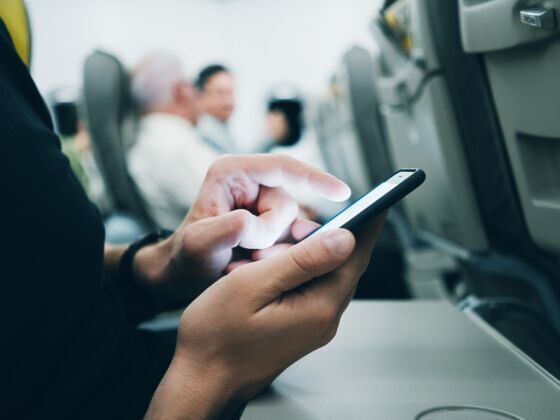Flights attendants are not glorified waiting staff. They are highly trained professionals whose job is, first and foremost, to keep passengers safe. So when they ask you to do something, whether that’s opening the window shades prior to take-off, switching your phone into airplane mode, or buckling up your seatbelt, you should just do it without protest. That includes notifying them if one of your personal electronic devices falls in between seats. They don’t make this very particular announcement at the start of every flight for no reason.


Why You Have to Tell a Flight Attendant if a Phone or Laptop Falls Between Seats
A lot of the electronic devices you carry with you when you travel are powered with lithium batteries, including cell phones, laptops, tablets, watches, cameras, portable external battery chargers, power banks, and more. The problem with lithium batteries is that they can overheat and sometime even create sparks if they are “damaged, overheated, exposed to water, overcharged, or improperly packed,” the Federal Aviation Administration (FAA) explains.
That’s why air travelers are not allowed to keep lithium battery-powered devices in their check-in bags — in case a fire breaks out in the luggage hold mid-flight. Instead, they must have them in their carry-on bags or personal items so that the devices can be monitored and, in the event of a fire, it can be put out.
An electronic device that falls in between airplane seats can easily get damaged, potentially leading to a battery fire. It’s especially true if the passenger tries to retrieve the device on their own by moving their seat. That’s why you notify the flight attendants so they can get it for you safely.
“We basically get on our knees and look for them. Most of the time they are easy to retrieve, just by removing seat cushions for easier access,” Nicolas Bessuejouls, who has been working as a flight attendant for the past 16 years, tells Matador Network. “Most of the times they are just adjacent to the seat and are very simple to reach. In Fist Class and Business Class it is more complicated as the seats are wider and have more mechanics,” he continues.
But what if the crew cannot retrieve the device? In this case, the passenger will have to wait until the plane has landed and ground maintenance personnel retrieves it. They will either remove parts of the seat to get access underneath, or dismantle it entirely, explains Tyler Herbert, an experienced airline pilot in Canada, in an email conversation. In the meantime, the seat cannot be adjusted in any ways. Herbert also says that he has seen phones retrieved after passengers move their seat and he confirms that they are “totally smashed.”
According to Herbert, devices get stuck between seats all the time. “People lay down and fall asleep and their phone falls off their body or out of a pocket and down a crack,” he says.
Just a few days ago, on Sunday May 19, 2024, a laptop that got stuck and could not be retrieved led to a United Airlines flight from Zurich to Chicago to turn back over the Atlantic Ocean and make an emergency landing in Ireland. The fire hazard was too great for the flight to continue.
“A fire on the plane while airborne is one of the worst emergencies that can occur,” Herbert explains. While there are fire extinguishers on board airplanes, however “if the fuel to the fire is blocked by a chair this can make it difficult to extinguish. If there is a fire on board this requires an immediate landing at the nearest airport,” he continues.
To date, the FAA has recorded 22 lithium battery air incidents in 2024. These incidents involved “smoke, fire, or extreme heat,” the report explains.